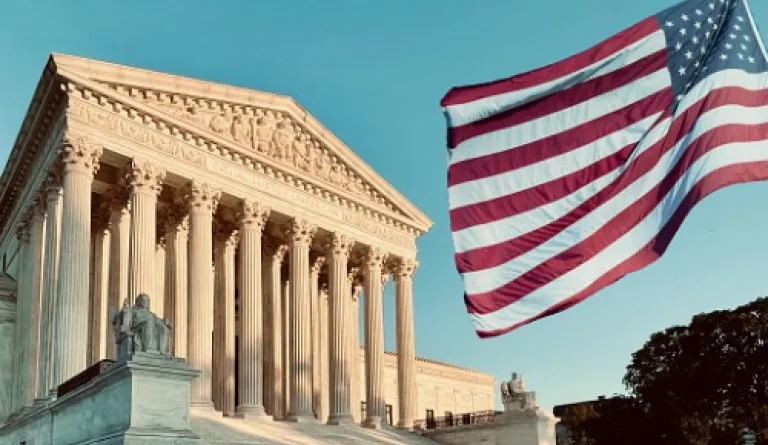Justice Alito and the Importance of Judicial Recusal

In recent weeks, events surrounding U.S. Supreme Court Justice Alito have prompted many discussions about when judges should recuse themselves from certain cases. Recusal is typically called for when a judge has interests, beliefs, or opinions about the case at hand that could interfere with their ability to make an unbiased ruling. The principles and procedures surrounding judicial recusal are fundamental to ensuring trust in our judiciary, and IAALS’ ongoing work in this sphere is more pertinent than ever.
Justice Alito has faced scrutiny due to his refusal to recuse himself from two cases related to the January 6 attack on the U.S. Capitol, despite calls to do so following news reports that controversial flags were displayed outside his properties. Critics say that these flags could be evidence that Alito is unable to be neutral in these cases, undermining the integrity of the Court and the public’s confidence in its impartiality.
Justice Alito has defended his actions and maintained that there is no legitimate basis for recusal, writing in letters to members of Congress that it was his wife’s decision to fly an upside-down American flag over their home in 2021 and an “Appeal to Heaven” flag at their New Jersey vacation home last year. Citing the Supreme Court’s newly adopted code of ethics, he claimed that “the two incidents you cite do not meet the conditions for recusal.”
This controversy has reignited a vital conversation about the standards and processes for judicial recusal in our nation’s highest court—and every state and federal court under it—and maintaining a trusted, accountable, and impartial judiciary. At IAALS, we have long championed reforms to ensure our judicial system meets these standards. Establishing effective recusal procedures requires balancing sometimes competing values. For example, procedures must be fair to both litigants and to judges without consuming too much of a court’s scarce time. They must be efficient while avoiding rushed judgment. They must be transparent but also respectful of judicial privacy.
Given these competing considerations, our recommendations on Judicial Recusal Procedures covers the creations of recusal procedures that are efficient, transparent, and fair to both judge and litigant—recommendations that continue to grow in importance as public trust in courts dwindles:
- Courts should have written, clearly articulated, and accessible recusal procedures that explain how to file a recusal motion and how the motion will be processed.
- Judges who are the subject of a recusal motion should not be permitted to rule on that motion, and the motion should instead be decided by another judge.
- Recusal procedures should include specified and expeditious time limits for deciding recusal motions to avoid uncertainty and delay for litigants and the court.
- Judges should explain denied recusal motions in writing or orally on the record.
- Effective appellate review of recusal denials should be in place, as well as standards for such review.
- There should be efficient procedures for replacing recused judges to minimize disruption.
- Judges should be able to seek confidential and non-binding advice about how to navigate recusal motions or self-recusal.
- Aggregate data should be collected on recusal activity to enhance transparency and facilitate assessment of the impact of, and compliance with, procedures.
While these recommendations were devised specifically with state courts in mind, their aim is one that could apply to any jurisdiction. The goal of these recommendations is to inspire public trust in a judiciary that is impartial both in fact and in appearance. The current situation involving Justice Alito highlights the importance of public trust in the judiciary’s recusal practices at all levels—including the U.S. Supreme Court. Even the appearance of bias may be a cause for recusal, as public trust hinges equally on the perception of impartiality as it does on actual impartiality. While justices themselves currently have the final say on their recusal decisions, adopting clear standards and procedures could enhance consistency and transparency.
IAALS remains dedicated to setting a new standard of high qualifications, accountability, and impartiality of judges. These stronger standards will ensure that communities across the country feel safe in the hands of their justice system.
